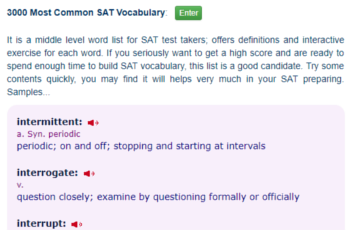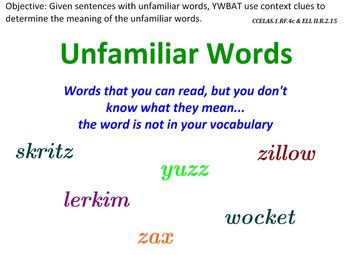Unfamiliar Words With Meaning And Sentence

200 words VOCABULARY with meaning, Sentence, Synonyms & Antonyms.
EAP Vocabulary - Working out the meaning of unknown wordsLearning vocabulary: Working out the meaning of unknown words Difficult words.It is unlikely that you will know every word in a text and even if you thinkyou have seen every word before, it is unlikely that you will have seen a particularword in its present context. It is therefore necessary to work out the meaningof unfamiliar words in context and, perhaps, familiar words in new contexts.This is necessary even if you have a dictionary as your dictionary does notknow the exact context in which the word is being used.A. Is it necessary to know the exact meaning of a particular word? Oftena rough meaning is enough (does the word have a positive or negative meaning?).First, though, you need to decide how important the word is for you and yoursubject.
For some words it is enough to know just enough about a word so youcan understand it when you hear or see it used in context. For other words,though, that you will need to use productively you will need as much informationas possible about the words.B. Look for definitions. The author may know a particular word may be newso explains. The author may also be using the word in a new, or unusual wayso will need to explain how it is being used.
This will be done by using a definition,an explanation, an example or by using a synonym (a word with the same meaning).The phrases ' called', ' knownas', ' is the name applied to',' in other words', ' thatis', 'is said to be' areoften used.Examples:1. The words ' polybrachygyny'and ' leks' are explained Some male birds spend all their time mating anddo not provide the female with any benefits other than indications oftheir vigour. This condition, called polybrachygyny, means that malesthat show the most effective displays are most persuasive in attractingfemales. These displays are given at localised courting places calledleks.2.
The phrases ' free-running experiments'and ' free-running rhythms' are explained. Because there are no constraints placed upon thetiming of the volunteer's activities in such a time-free environment,these are called free-running experiments and the rhythms measured duringthem are known as free-running rhythms.3. Synonym in apposition or with ' or'A majority of experts agree that neandertaloids werethe first members of our species, Homo sapiens.Most metals are malleable; they can be hammered intoflat sheets; nonmetals lack this quality. Some metals are also ductile;they can be drawn out into thin wires; nonmetals are not usually ductile.Glandular fever, or infectious mononucleosis, isa serious disease.Each transformed organism is fitted to or adaptedto its habitat.4. ExampleWe humans are Animalia: mobile, multicelledorganisms that derive energy from ingestion ('eating').Methadone is an example of a synthetic narcotic drug.5.
Description The Anthropoidea, on the other hand, are sometimescalled the 'higher primates.' They have relatively largerand rounder skull cases, flatter faces, and mobile lips detached fromthe gums.6. Explanation using ' that is' Each tribal group, identified by the languageit speaks, is an exogamous unit; that is, people must marry outsidethe group and therefore always marry someone who speaks another language.7. Explanation using '-' Today, the sense of anomie - alienation, disconnectedness- at Apple is major.Exercises:C. Work out the meaning of the word or phrase.' Twas brillig, and the slithy tovesDidgyre and gimble in the wabe:All mimsy were the borogoves,And the momeraths outgrabe.(From Lewis Carroll's 'Jabberwocky')There are two main approaches to doing this.

It may not tell you the exactmeaning of the word, but it may help you to narrow down the possibilities sothe text makes sense:1. You can analyse the word itself. You can look inside the word. Youcan use your knowledge of similar words and look at how the word is constructed.Using this information you can find information about (a) the meaning ofthe word as well as (b) grammatical information.a.
Affixes can help you work out the meaning of an unfamiliar word.For example, if you do not know the meaning of the word ' incomprehensible',you can work it out if you are familiar with ' comprehend'meaning understand, ' in' meaningnot, and ' -ible' meaning can.Therefore ' an incomprehensible sentence'refers to a sentence that you cannot understand.In the Jabberwocky text above, we know ' outgrabe'is a verb because ' out-' is acommon verb prefix (' outwit',' outdo')b. It is not usually difficult to work out the grammatical category:noun, verb, adjective, adverb etc. If the word ends in ' -ing'or ' -ed' it could be a verb;if the word ends in ' -ly', itmay be an adverb; if the word ends in ' -tion',it is possibly a noun. If the word ends in ' -ise',it is probably a verb. If you see a sentence like ' Thespid claned lanly', you can work out that ' claned'is the past tense of the verb ' clane',and ' lanly' is an adverb.In the Jabberwocky text above, we know ' borogroves',' raths' and ' toves'are nouns because ' -s' is a commonnoun suffix, and ' slithy' isan adjective because ' -y' isa common adjective suffix.2. You can use the context. You can make use of the other words, phrases,sentences and information around the problematic word.
Using this informationyou can find information about the meaning of the word as well as grammaticalinformation. (a) Grammatical information can be obtained from the placeof the word in the sentence. (b) Information about the meaning of the wordcan come from the meanings of the other words in the context.a.
Unfamiliar English Words With Meaning And Sentence
By using your knowledge of typical English clause and phrase structure,you can often work out the grammatical function of a particular word.Typical clause structures are SVO, SVA, SVOC.In the sentence, ' The spid claned lanly',as articles usually precede nouns, you can also assume that ' spid'is a noun.In the Jabberwocky text above, we know ' slithy'is an adjective because it comes between ' the'and ' toves'.b. Information about the meaning of the word can come from the meaningsof the other words in the context. Using your knowledge of the worldand your subject can help. You can, for example, make use of your knowledgeof the relationship between object and purpose, ' Hetook the. And drank', ' Shesat on the.'
Or cause and effect, 'T heheavy. Caused the river to rise'.
50 Unfamiliar Words With Definition
Words and phrases connectedwith ' and', ' moreover'or ' in addition' will have relatedmeanings and clauses connected with ' while'or ' although' will have oppositemeanings. ImportantYou will need to use context even with simple words like ' like',' too', ' light',' fly', as they have different meaningsand grammatical forms. You will also need to use the context to determine whichmeaning of a word is being used in a particular situation.